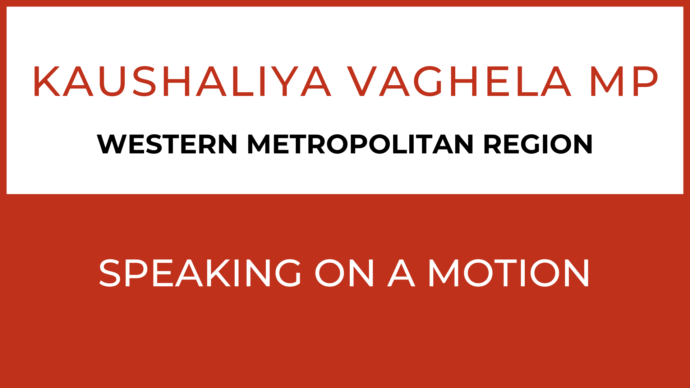Ms VAGHELA (Western Metropolitan):
I too rise to speak on the loneliness motion, motion 654. I thank Ms Patten for bringing this motion to the house. Human beings are social animals. We seek social interactions; it is part of our evolutionary behaviour. So it makes sense that when people are alone they will face difficulty.
Often loneliness is used as a catch-all term. Loneliness is a feeling of distress people feel when they have not had any meaningful social interactions. Research has shown that there are cyclical links between social isolation, loneliness and poorer physical and mental health. In 2018 researchers from Swinburne University and the Australian Psychological Society conducted a national survey of 1678 adults. VicHealth also conducted a loneliness survey of young Australians in 2019. Many people who were lonely before the pandemic would have felt increased impacts during the COVID-19 restrictions.
The Andrews Labor government has taken a strong stance when it comes to mental health. We have made the single largest investment into mental health in Australian history. We have committed $3.8 billion to build a new mental health system from its foundations. We have been committed to implementing all recommendations of the Royal Commission into Victoria’s Mental Health System. In the final report of the royal commission the broad issue of loneliness and social isolation is covered. The royal commission’s recommendation 15 touches on the impact of loneliness on mental health and wellbeing. It also recommends several interventions to strengthen local communities. We have accepted all recommendations of the royal commission, and we are working towards implementing all of them.
The 2021–22 Victorian budget funded $16 million over four years for social prescribing trials. This funding will support this innovative new model. Through social prescriptions patients are provided with non-medical support to help to boost their overall wellbeing. Prescriptions can include developing hobbies, exercise or even adoption of a pet. As recommended by the Royal Commission into Victoria’s Mental Health System, social prescribing trials will be undertaken in the first six local adult and older adult mental health and wellbeing services sites from July 2022. Research has shown that loneliness is more common in young people of ages 15 to 25 and older people who are 75 and above. This initiative will support consumers, particularly older people. These trials will link to local community and social activities, including exercise groups, men’s sheds, neighbourhood houses, sports, arts, volunteering and intergenerational programs. By getting people connected to the community they should feel less lonely. Community is not just based on geographic space; it is also anyone who shares common interests. During the pandemic the internet has enabled a lot of such support groups through shared interests, and now that we are opening up people can form groups outside as well. Developing meaningful connections is the key to combating loneliness. Through these trials we will be able to see concrete results.
Community collectives will also be established in each of the state’s 79 local government areas to bring the community together and to guide and lead local social connection and inclusion efforts. The collectives will take the lead in consulting with local communities to identify challenges and opportunities to promote community participation and take action to support the mental health and wellbeing of their communities. They will identify community groups at greater risk of experiencing social isolation and social exclusion and work to inform the wellbeing priorities of each local council’s municipal health and wellbeing plan.
Each community collective will be supported by local government and made up of a broad and diverse range of community members and local leaders determined by the community.
Research into social relationships and isolation has shown that positive relationships support good mental and physical health. There are activities that a person can do to lower their levels of loneliness, such as access to paid work, caring, volunteering and active memberships in sporting and community organisations. However, the effectiveness of these interventions is mixed and not consistent across all cohorts. The Andrews Labor government has supported men’s wellbeing and community connections through providing funding for establishing, expanding or improving men’s sheds. Men’s sheds are safe and productive places where men can get together and build projects and friendships. They also contribute to the community through their projects. Men’s sheds can have extraordinary benefits towards forming meaningful connections while upskilling. They promote social interactions and inclusion. The Andrews Labor government provides $1 million to support men’s sheds each year.
As I mentioned before, older people are at a higher risk of feeling loneliness. Seniors of multicultural backgrounds may also feel the impact of loneliness due to cultural differences. Therefore the Victorian government is supporting seniors from multicultural backgrounds. The Andrews Labor government has provided a share in $7.4 million dollars to more than 900 multicultural seniors organisations over the next four years. This support of up to $2000 per year will help the delivery of in-person and digital activities by community groups. I have met several seniors groups in the Western Metropolitan Region, and I know how important social interactions and relationships are for that particular cohort. All these initiatives and supports help in removing loneliness and isolation for Victorians, and of course a lot more still can be done for tackling loneliness. I thank again Ms Patten for this important motion.
